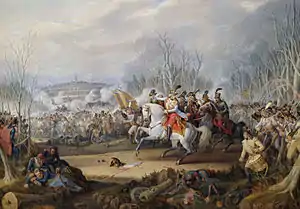Battle of Biberach (1796)
The Battle of Biberach was fought on 2 October 1796 between a First French Republic army led by Jean Victor Marie Moreau and a Habsburg Austrian army led by Maximilian Anton Karl, Count Baillet de Latour. The French army paused in its retreat toward the Rhine River to savage the pursuing Austrians. The action occurred during the War of the First Coalition, part of the French Revolutionary Wars. Biberach an der Riss is located 35 kilometres (22 mi) southwest of Ulm.
| Battle of Biberach (1796) | |||||||
|---|---|---|---|---|---|---|---|
| Part of the French Revolutionary Wars | |||||||
 | |||||||
| |||||||
| Belligerents | |||||||
|
|
| ||||||
| Commanders and leaders | |||||||
|
|
| ||||||
| Strength | |||||||
| 35,000 | 15,000 | ||||||
| Casualties and losses | |||||||
| 500 | 4,300, 18 guns, 2 colors | ||||||
During the summer of 1796, the two armies of Jean-Baptiste Jourdan in the north and Moreau in the south advanced into southern Germany. They were opposed by Archduke Charles, Duke of Teschen who oversaw two Austrian armies under Latour and Wilhelm von Wartensleben. At the Battle of Amberg on 24 August 1796, Charles and Wartensleben combined to throw superior strength against Jourdan while Moreau was separated from his colleague. After Jourdan was beaten again at the Battle of Würzburg on 3 September, Moreau was forced to abandon southern Bavaria to avoid being cut off from France. As the outnumbered Latour doggedly followed the French retreat, Moreau lashed out at him at Biberach. For a loss of 500 soldiers killed and wounded, Moreau's troops inflicted 300 killed and wounded on their enemies and captured 4,000 prisoners, 18 artillery pieces, and two colors. After the engagement, Latour followed the French at a more respectful distance. The next action was the Battle of Emmendingen on 19 October.

References
- Smith, Digby. The Napoleonic Wars Data Book. London: Greenhill, 1998. ISBN 1-85367-276-9